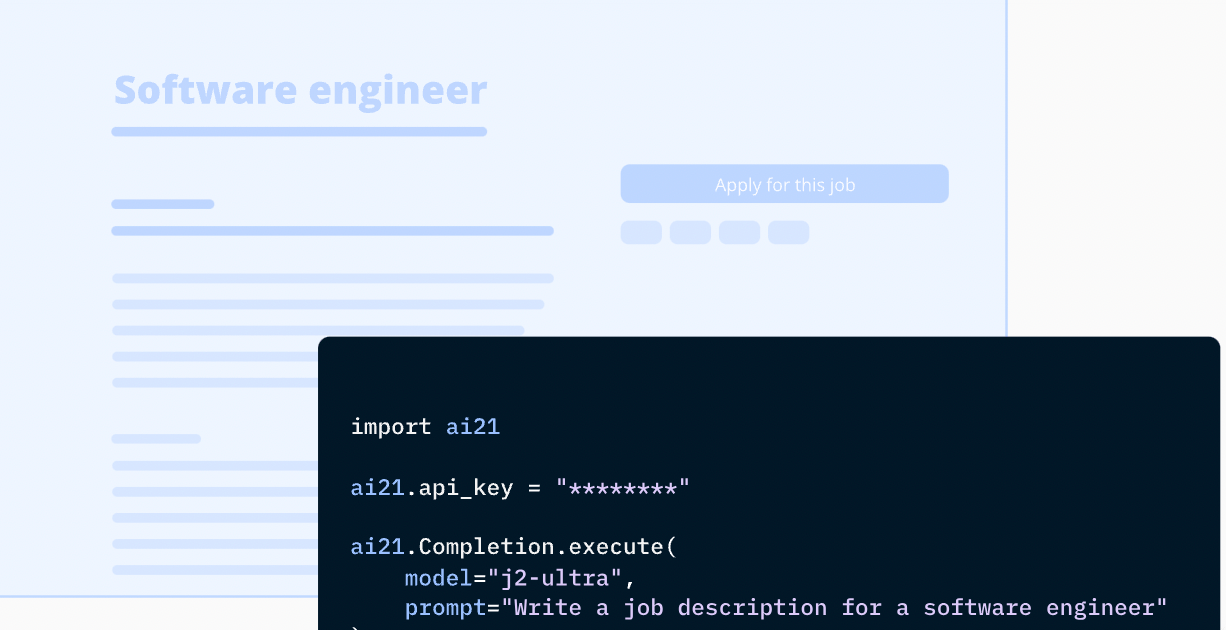
Welcome, AI Enthusiasts.
AI21 Labs, an AI startup, is challenging the notion that generative AI models with large context windows have to be computationally intensive.
After the departure of Panos Panay from Microsoft, the company split its Windows and Surface divisions into separate teams, aiming to emphasize web and AI features under Mikhail Parakhin's leadership.
In today’s issue:
🤖 AI21 Labs Introduces Advanced AI Model with Exceptional Contextual Understanding
🦾 AI21 Labs Introduces Advanced AI Model with Exceptional Contextual Understanding
🛠️ 3 New AI tools
💻 Custom prompts ChatGPT and DALL-E 3
🤖 3 Quick AI updates
Read time: 4 minutes.
LATEST HIGHLIGHTS

Image source:AI21 Labs
To recap: AI21 Labs, an AI startup, is challenging the notion that generative AI models with large context windows have to be computationally intensive. They've introduced Jamba, a text-generating and -analyzing model that boasts an impressive context window of up to 140,000 tokens while running on a single GPU with at least 80GB of memory. This surpasses the context window of Meta's Llama 2, which requires a GPU with less memory. Jamba utilizes a combination of transformer and state space model (SSM) architectures, offering both complex reasoning capabilities and computational efficiency. While Jamba has been released under an open-source license, it's intended for research purposes and lacks safeguards against generating toxic text or addressing potential biases. Nonetheless, AI21 Labs sees promising potential in the SSM architecture, believing that further improvements will enhance its performance.
The details:
1. Jamba, developed by AI21 Labs, is a text-generating and -analyzing model with an impressive context window of up to 140,000 tokens, running on a single GPU with at least 80GB of memory.
2. Unlike Meta's Llama 2, which requires a GPU with less memory but has a smaller context window, Jamba combines transformer and state space model (SSM) architectures for both complex reasoning capabilities and computational efficiency.
3. While Jamba has been released under an open-source license for research purposes, it lacks safeguards against generating toxic text or addressing potential biases, although AI21 Labs plans to release a safer version in the future.
Here is the key takeaway: AI21 Labs has introduced Jamba, a highly efficient and powerful text-generating model that challenges the notion that large-context AI models are inherently computationally intensive. By combining transformer and state space model (SSM) architectures, Jamba achieves impressive performance while running on relatively modest hardware. However, it's important to note that while Jamba has been released for research purposes, it lacks safeguards against generating harmful or biased content, emphasizing the need for responsible AI development and deployment.

Image source: Unspalsh
In Summary: After the departure of Panos Panay from Microsoft, the company split its Windows and Surface divisions into separate teams, aiming to emphasize web and AI features under Mikhail Parakhin's leadership. However, this strategy faced setbacks, leading to a recent reshuffling that reunited Windows and Surface under Pavan Davuluri's leadership. Mustafa Suleyman, DeepMind co-founder, now heads Microsoft's consumer AI efforts. The move signifies Microsoft's renewed focus on AI-powered PCs, with upcoming hardware releases expected to leverage custom processors and Qualcomm's Snapdragon Elite X chips. This shift highlights Microsoft's commitment to integrating hardware and software in the AI era, but the company must articulate the significance of AI PCs beyond marketing hype.
Key points:
1. Following Panos Panay's departure, Microsoft split its Windows and Surface divisions but recently reunited them under Pavan Davuluri's leadership.
2. Mustafa Suleyman, co-founder of DeepMind, now leads Microsoft's consumer AI efforts, signaling a renewed focus on AI-powered PCs.
3. Microsoft's upcoming hardware releases are expected to leverage custom processors and Qualcomm's Snapdragon Elite X chips, marking a significant shift in its hardware strategy.
4. The company aims to articulate the significance of AI PCs beyond marketing hype, emphasizing the integration of hardware and software in the AI era.
Our thoughts: As a tech writer, I find Microsoft's recent reshuffling of its Windows and Surface divisions intriguing. The reunion under Pavan Davuluri's leadership suggests a strategic pivot towards a more integrated approach to hardware and software development, particularly in the context of AI-powered PCs. Mustafa Suleyman's appointment to lead consumer AI efforts indicates a strong commitment to advancing AI technologies within Microsoft's product ecosystem. The upcoming hardware releases leveraging custom processors and Qualcomm's Snapdragon Elite X chips present exciting opportunities for innovation in the PC market. However, Microsoft must effectively communicate the real-world benefits of AI PCs to consumers beyond mere marketing buzzwords to drive adoption and differentiation in the competitive landscape.
TRENDING TECHS
🛠 Sensay- Dementia Care with lifelike AI Replicas.
🧾 Afforai-Summarize, Translate, & Interact with Your Documents
🤖 Cycle- Your feedback hub, on autopilot
AI DOJO
Script writing:
Prompt: Craft a dialogue between a time traveler from the future and a historian from the present
DALL-E 3
Image creation:
Prompt: Generate images of delicious desserts from different cultures
QUICK BYTES
Lenovo is poised to differentiate itself in the PC market by introducing proprietary AI features beyond Microsoft's Copilot. Leon Yu, leading Lenovo's Consumer Business in the Asia Pacific, unveiled the company's plans to offer unique AI experiences, leveraging in-house developments and collaboration with Microsoft. While details remain undisclosed, Lenovo's focus is on enhancing user experiences through AI-driven interactions, prioritizing practical applications over technical benchmarks. With the launch of its latest AI PC lineup, including innovative models like the Yoga 9i and Yoga Pro 9i, Lenovo aims to leverage generative AI to revolutionize content creation and establish itself as an industry innovator.
Skyflow, a data privacy startup, secured a $30 million Series B extension led by Khosla Ventures, indicating its growth and adaptability in the face of rising demand for privacy solutions amid the AI boom. The funding follows Skyflow's expansion into AI-related software offerings, with revenues from large language model-related usage growing to around 30%. This expansion reflects the growing need for data-management services amidst the data voracity of LLMs. The round, labeled an extension instead of a Series C, highlights the evolving fundraising landscape, with late-stage investors pulling back while early growth investors remain active. Skyflow's robust growth, doubling in size and reaching double-digit million revenue figures, underscores the increasing importance of data privacy infrastructure in protecting sensitive data, especially in enterprise settings. This funding round reflects broader trends, including startups seeking more modest capital follow-on rounds, the growing demand for AI infrastructure and support, and the resilience of API-based business models. Skyflow's trajectory offers insights into the expanding enterprise demand for LLMs and the opportunities in the data privacy sector amid the ongoing software gold rush fueled by AI.
Amazon has further invested $2.75 billion in Anthropic, doubling down on its initial $1.25 billion investment made last September. The decision comes just before the end of the first quarter, signaling confidence in Anthropic's AI capabilities. Anthropic's AI models compete at the highest levels, alongside OpenAI and Google's Gemini, making it a strategic investment for Amazon, which lacks the capability to develop such models independently. The move reflects the ongoing trend of tech giants pouring cash into the AI sector, positioning themselves strategically in the evolving landscape of artificial intelligence.
SPONSOR US
🦾 Get your product in front of AI enthusiasts
THAT’S A WRAP
